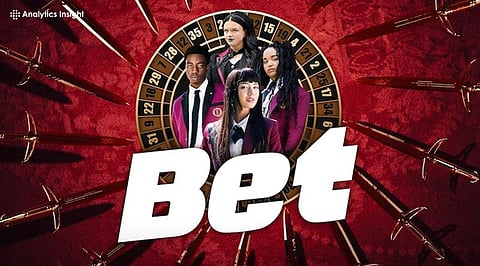

Bet, the live-action adaptation of Kakegurui, did makeit into Netflix's Top 10 in 32 countries, gathering more than 13 million hours in viewership.
The series follows Yumeko Kawamoto and her adventures in disrupting underground gambling in an elite boarding school, mixing psychological thriller elements with drama.
Certain viewers loved the story and acting, but several have differing opinions about it shifting away from the original Asian-centric setting and characters of the manga.
Netflix's newest teen drama, Bet, has entered the Top 10 charts in 32 countries in just one week. The show offers a live-action look at the Japanese manga Kakegurui, which exposes a world of high-stakes gambling and power dynamics. Let’s have a look at what this live adaptation brings to the table and how well it has adapted elements from the original manga.
Bet is based on the acclaimed manga Kakegurui, created by Homura Kawamoto and Tōru Naomura. Since its initial serialization in 2014, Kakegurui immediately became quite popular because of its unique juxtaposition of psychology-thriller-gambling themes.
At the heart of the story lies Yumeko Jabami, a compulsive gambler who dismantles the social order of Hyakkaou Private Academy, a school where students remain ranked according to their gambling prowess. The manga is famous worldwide due to its intense characters and unpredictable plot twists, thus being ripe for live-action adaptation.
Set in St. Dominic's Boarding School for Girls, where gambling dictates the social hierarchy. Yumeko Kawamoto, portrayed by Miku Martineau, is a transfer student who shakes up the established order as she takes on the student council in high-stakes gambles.
The show touches on power, obsession, and the exhilaration of putting it all at risk.
The ensemble cast is diverse, featuring Ayo Solanke as Ryan Adebayo and Eve Edwards as Mary Davis. Clara Alexandrova stars as the fierce student council president, Kira Timurov. Each character conveys depth in the storyline, reflecting complex social structures in the school.
Immensely promoted for their quantizing visuals and slick cinematography, Bet was conceptualized by Simon Barry-the same mind who also gave us Warrior Nun. Dramatic lighting and insane close-ups all throughout gambling scenes yield an atmosphere of heightened tension and suspense as the psychological stakes are being asserted.
While undeniably successful in attracting attention, the adaptation has received criticism from purists in the manga audience. Some feel that by diverting from the source material, especially with character building and cultural nuances, the adaptation has never stood the rightful claim of being a legitimate one.
Casting was even discussed on general principles of representation and respect for the culture in which the original was framed.
A shift of location from Japan to the West is worthy of slight contention when it comes to Bet. It is argued that such a translation will dilute the cultural undertones that formed the heart of the original tale.
This adaptation, itself, gives rise to a much bigger set of conundrums: if atmospherics is subsumed into culture, then how do culturally specific stories stand for a global audience?
From the mixed reviews, it can be inferred that it is possible for the show to gather enough strength for some more seasons. Provided Netflix pays heed to the criticisms and stays true to the core concepts of the original manga while treating issues with care, all-out respect, and adaptation appropriateness.
Bet might be developing into something more compelling than a simple live adaptation. This would allow it to stand on its own for new viewers as well as longtime Kakegurui fans.
Bet has performed well in terms of ratings since its inception. According to Netflix, the series had recorded 2.4 million views internationally in 7 days and 13.7 million hours of watching, ranking ninth globally in the meantime. It has managed to stay in the top 10 in 32 countries, despite hardly any marketing efforts.
The streaming platform's recommendation algorithm must have played a large part in driving organic viewership to the series, indicating a fairly strong connection with teens and young adults.
Bet is representative of Netflix's attempt to bring adaptations of manga to a global audience. While the series does provide drama with high stakes and excitement in visuals, it also delves deep into the problems of cultural adaptation. The reception of the show has shown that when it comes to adaptations, the balance between creative reinterpretation and respecting the culture of the original material becomes very important.
If this momentum is maintained and the feedback that matters is addressed, Bet can become yet another long-run victory for Netflix in its manga adaptation efforts.
